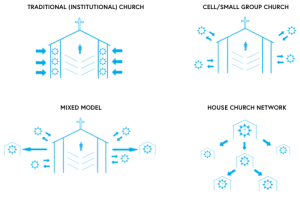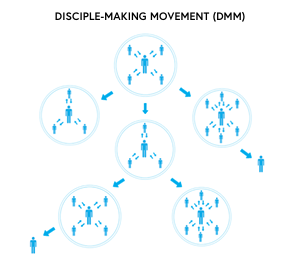This article is a follow up article to Building Churches that Align with Jesus’ Outcomes. There I talked about how important it is to rightly discern what Jesus’ outcomes are for his church. I suggested that the big commands of loving God, loving neighbours, and making disciples can be broken down into specific measurable behaviours that help us to know if we’re growing healthy disciples and healthy churches. I proposed that we need to reflect on the decisions we make as individuals and as a church in support of the outcomes Jesus desires. If we don’t understand what our goals are, and the decisions we make to get to those goals, then it becomes easy to miss them.
At the end of the article I say, “We must ask what decisions we are making today that lead to the outcomes that Jesus wants. This is hard and requires, in many cases, that we confront the idols at work in Canadian society.” We’ll get to idols in another article. First I’d like to talk about a sacred cow – the institutional structures that we use for church. It’s so easy to assume that the structures we have for church are benign. But the structures reflect what we believe about the best way to achieve outcomes.
Consider for a moment the recent concern over federal challenges to the charitable status of organizations that exist to promote religion (See EFC video: https://www.evangelicalfellowship.ca/Resources/Videos/Concern-over-federal-challenges-to-charitable-stat). If churches were to lose their charitable status this, in turn, could significantly change the economy of a local congregation and significantly upset its institutional structure. Staffing might be reduced. Building maintenance budgets trimmed. Mission and outreach budgets could be cut. Institutional structures absolutely impact how we achieve Jesus’ desired outcomes.
As a leader of an organization that seeks to catalyze disciple-making movements, I want to advocate for a grassroots decentralized model of forming the institutional structure of a church. At Novo Canada we believe this is an excellent way to keep the institution in the background and maximize every believer’s ability to love God, love our neighbours, and make disciples. (DMM – To get an overview of DMM you can check out the Novo Canada or 24:14 Network website.)
Grassroots decentralization is a contrast to most models of the church we’re familiar with. Big Life, a movement ministry, has illustrations of four of the most common institutional structures of churches (see below).

In the models, the arrows indicate the primary movement of people connected to the church.
In a traditional model for example, people go to the building to participate in ‘church’ life. Worship (cross) and community (small circles) are tied to the building and facilitated by a pastor (human figure). This model typically adds people to the congregation through invitation not through mission.
A cell model has small groups that operate in homes or third spaces but the center of community life is the gathering in the big building. People seeking Christ still need to “come to church”.
A mixed model is like the cell model but also includes the birth of new congregations that are home based – often called micro-churches.
A house church network employs some form of church planting strategy and, of course, is home based. Here leadership begins to be decentralized too, but the primary movement of participants is still in, not out into the community.
Alternatively, have a look at the illustration of the DMM model below.

The goal of grassroots decentralization is to maximize the touch points disciples have among people who don’t know Jesus – going is the default posture. The relationships we have in our spheres of influence become the pathway for the Gospel. Every disciple is empowered to make disciples, who form groups, and then form churches. From a structural perspective there is nothing to invite a person to. There’s no program and no service – just loving relationships and hopefully, flourishing community. With every disciple engaged in the harvest at some level, our faith is on display in and for the world.
Consider a few of the outcomes from the previous article.
If loving God is important to us, and we believe that holiness is an outcome worth pursuing, then who better to recognize the work of Christ making us holy than people who are in darkness. Without holiness we would appear just like anyone else to the people we meet.
If we say that loving our neighbours is important to us, and we believe that hospitality is an outcome, then the people we are loving are the best people to comment on whether hospitality is evident in our lives. Hospitality plays a key role in our ability to make new disciples.
We need to remember that Christ being formed in us is not for our benefit alone, but for the benefit of the world. Grassroots decentralization activates each of us, directs us, and empowers us to make Christ known in word, deed, and power.
This often makes pastors and leaders nervous for several reasons.
One valid concern is that everybody is left to their own devices – they read their books, they listen to their media, they ultimately form their own opinions and go their separate ways. In this critique the result of grassroots decentralization is that there is an increase of atomization, segregation, and isolation.
I agree with their concerns. That is certainly what can happen if decentralization is introduced to a church without other accompanying changes. But in any model, we need to consider the saying, “What you win them with you win them to.”
In disciple-making movements we decentralize in the context of formation. Formation is the appearance of Christ-like characteristics in the life of a believer. Formation in DMM also implies a few things. First, formation takes place in relationships, not through a program. To be effective and successful in this model there is a personal cost. As Robin Waller from Lift Church notes, we must make time for each other, be vulnerable with each other, and be generous and hospitable to disciple well. These precursors of formation are enhanced by physical proximity.
Second, every disciple is being discipled with the goal of becoming a disciple-maker. We form a disciple-maker through modelling and mentoring/coaching relationships. Disciple making begins with ordinary followers of Jesus listening to the Holy Spirit as he leads them to a “person of peace” or a spiritually curious person. They are then encouraged and supported by the person who is discipling them to enter a relationship with that person. Ideally, the relationship is a long-term life-on-life impartation that has benefits that go both ways. The spiritually curious person is invited to gather people together from their family and friends to form a group who journey towards Jesus together. Relational discipleship is enabled because the institution is simple and the organization is flat and doesn’t require significant time or energy to maintain it.
Another critique that sometimes arises is, if you are successful at starting a movement and micro-churches are formed, then who is responsible for oversight, and how do you determine who is affiliated with whom? In DMM we turn that question upside down. The answer comes from the disciple who can answer the question, “Who is discipling you?” and “Who are you in community with?” The motivation for DMM is Christ’s love for the world and if we are making disciples in the way of Jesus then the bonds that bind us together naturally appear.
Compared to traditional models of church, DMM has the potential to be extremely messy, but if done well it is also full of energy, joy, community, love, and healing for believers and for the world.
Every gathering of people eventually becomes organized and takes an institutional shape. The question is, what institution is actually best for producing the disciples that Jesus desires? And, as theologian Harvey Kwiyani asks, are we growing churches that “carry the essence of Acts 2: shared bread, shared prayers, shared burdens, and shared urgency.”
John Hall is President of Novo Canada. Novo Canada is a mission organization that raises up teams of ordinary Christians in Canada to reach Canada, and the nations. Prior to working with Novo Canada John led Mission Central for 9 years.




